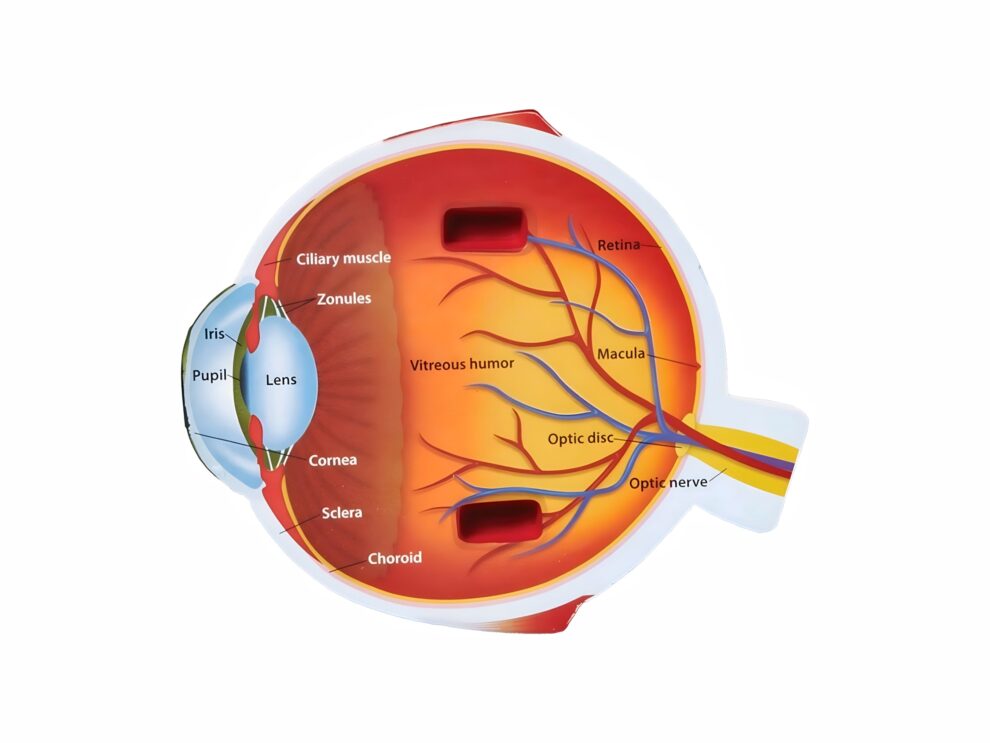Retina

Retina
The retina is a thin layer of light-sensitive tissue lining the back of your eye, similar to film in a camera. It plays a vital role in vision by capturing light and converting it into electrical signals that your brain interprets as images.
At Kitsap Eye Physicians, our experienced eye doctors are dedicated to protecting your vision from various retinal conditions.
What is the Retina?
Imagine the eyeball as a hollow sphere. The outer layer is a tough, white coat called the sclera.
The front part of the sclera is transparent and forms the cornea, which helps focus light entering the eye. Behind the cornea is a colored ring called the iris, which controls the amount of light entering the eye like a camera’s aperture.
In the center of the iris is a black opening called the pupil. Light passes through the pupil and lens, focusing on the retina at the back of the eyeball.
The retina is a complex structure with millions of light-sensitive cells called photoreceptors.
These come in two main types:
Rods
Responsible for vision in low light conditions (night vision).
Cones
Provide color vision and function best in bright light.
The photoreceptors in the retina convert light energy into electrical signals. These signals travel through a network of nerve cells in the retina and ultimately reach the optic nerve, a bundle of nerve fibers that carries visual information from your eye to your brain.
How Does the Retina Work?

Here’s a simplified breakdown of how the retina works:
1. Light Enters the Eye: Light enters the eye through the cornea and pupil.
2. Light is Focused: The lens focuses the light rays onto the retina.
3. Photoreceptors Capture Light: The light-sensitive rods and cones in the retina absorb the focused light.
4. Signals are Created: The photoreceptors convert the light energy into electrical signals.
5. Signals Travel Through the Retina: Electrical signals travel through a network of nerve cells in the retina.
6. Signals Reach the Optic Nerve: The processed signals reach the optic nerve.
7. Signals Sent to the Brain: The optic nerve carries the visual information to the brain.
8. Brain Interprets Images: The brain interprets the electrical signals as images, allowing you to see the world around you.
Common Conditions Affecting the Retina
Several conditions can affect the retina, potentially impacting your vision. Here’s an overview of some common retinal conditions:
Macular Degeneration
This age-related condition affects the macula, the central part of the retina responsible for sharp, central vision. Macular degeneration can cause blurred vision, distorted central vision, and difficulty seeing colors.
Diabetic Retinopathy
This complication of diabetes damages the blood vessels in the retina. It can lead to vision problems like blurred vision, bleeding in the eye, and even blindness if left untreated.
Retinal Detachment
This serious condition occurs when the retina separates from the underlying layer of tissue. Symptoms can include sudden flashes of light, floaters (seeing tiny specks in your vision), and a curtain-like shadow moving across your field of vision.
Retinal detachment requires prompt medical attention to prevent vision loss.
Flashes and Floaters
While occasional flashes and floaters may be harmless, a sudden increase in these symptoms can sometimes be a warning sign of retinal problems like detachment or tears. It’s crucial to see an eye doctor if you experience a significant increase in flashes and floaters.
Macular Hole
A macular hole is a small opening that develops in the macula, causing blurred central vision and difficulty seeing fine details.
Uveitis
Uveitis is an inflammation of the uvea, the middle layer of the eye that includes the iris. Uveitis can cause blurry vision, eye pain, and light sensitivity.
How Are Retinal Conditions Treated?
While Kitsap Eye Physicians doesn’t directly provide treatment for retinal conditions, we understand the importance of prompt diagnosis and specialized care. We work closely with a network of trusted retina specialists in our community to ensure you receive the most appropriate care for your specific retinal condition.
Early Detection is Key
Regular eye exams are crucial for early detection of retinal problems. During your eye exam, your doctor at Kitsap Eye Physicians will check your retina for any signs of abnormalities. Early detection and treatment of retinal conditions can significantly improve the chances of preserving your vision.
Working with Retina Specialists
If your doctor suspects a retinal condition, they will refer you to a qualified retina specialist. Retina specialists are ophthalmologists (eye doctors) who have completed additional training in diagnosing and treating diseases of the retina and vitreous, which is the jelly-like substance that fills the center of your eye.
Retina specialists have access to advanced diagnostic tools and treatment options for retinal conditions.
Anti-VEGF injections
These injections are used to treat conditions like macular degeneration and diabetic retinopathy. They target a protein called vascular endothelial growth factor (VEGF), which can contribute to abnormal blood vessel growth and fluid leakage in the retina.
By inhibiting VEGF, these injections can help prevent vision loss.
Laser surgery
Laser treatments can be used for various retinal conditions, such as sealing retinal tears, treating diabetic retinopathy, and creating a barrier around a macular hole to promote healing.
Vitrectomy
In some cases, a surgical procedure called a vitrectomy may be necessary. During a vitrectomy, the vitreous gel is removed from the eye, and the surgeon can then address underlying retinal problems.
Pneumatic Retinectomy
This procedure involves injecting a gas bubble into the vitreous cavity to help flatten a detached retina.
Scleral Buckling
For certain types of retinal detachments, a scleral buckle may be used. This involves placing a band, referred to as the buckle, on the outside of the eye to help push the wall of the eye inward and reattach the retina.
Importance of Following Your Doctor’s Recommendations
If you’re diagnosed with a retinal condition, it’s crucial to follow your doctor’s recommendations carefully. This may involve treatment with medications, injections, or surgery, depending on the specific condition and its severity.
Regular follow-up appointments are also essential to monitor your condition and adjust treatment as needed. Taking care of your overall health is vital for maintaining good eye health.
Eating a healthy diet, managing diabetes and high blood pressure, and wearing sunglasses that block ultraviolet (UV) rays can all help protect your vision and reduce the risk of developing retinal problems.
Kitsap Eye Physicians: Your Partner in Eye Care
We work closely with a network of qualified retina specialists to ensure you have access to the most advanced treatment options available for any retinal conditions you may face.
By scheduling regular eye exams, maintaining a healthy lifestyle, and working with a team of eye care professionals, you can take proactive steps to protect your vision and preserve your sight for years to come.
Are you experiencing symptoms of a retinal condition? Schedule an appointment at Kitsap Eye Physicians in Bremerton, WA, today!

